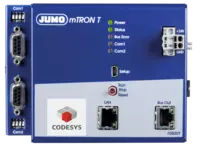

Keeping the overview with JUMO mTRON T
Automatized glass density measurement
Glass is a material with very special features. Instead of a melting point, it has a transformation range. When within that range, it slowly becomes softer and then melts. Glass is available in many different types with different compositions, which is why some properties of the material are variable. Numerous parameters must be monitored during the complex production process. Together with the JUMO Engineering Team, Aerne Analytic e. K., a specialist manufacturer of laboratory equipment, has now developed a measuring device that facilitates fully automatic measurement of density.
Task
The density of glass samples is measured using the sink-float method developed by M. A. Knight. This means that each of the 6 test jars is filled with 2 glass specimens and 1 additional reference sample. The test jars are filled with a test liquid consisting of a mixture of bromine naphtalene or tetrabromoethane. This liquid is heated indirectly in a water bath with distilled water. The density of the test liquid must be greater than the density of the glass body when the measurement process begins. This causes the glass to float on the surface. When the measuring process begins, the bath temperature is slowly increased. This naturally also increases the temperature of the test liquid. Its density decreases as the temperature rises. The result is that the glass samples sink quickly or slowly, depending on their own density. After a certain amount of time, the glass bodies are passed through a light gate that automatically recognizes whether the tested object is the reference sample or the glass sample. The density of the glass samples is calculated and displayed depending on the various temperatures when they pass through the light gate as well as the associated times.

The solution for determining glass density that JUMO has developed with Aerne Analytic e.K.
Solution approach
The technical solution was implemented using the JUMO mTRON T automation system. To achieve the required measuring accuracy of ±0.0002 grams per cubic centimeter, extremely precise hardware must be used. JUMO RTD temperature probes from the class A category and the highly precise, galvanically isolated JUMO mTRON T four-channel analog input modules
make this possible. Measurement data can be extracted from the JUMO mTRON T multifunction panel using a USB flash drive or Ethernet interface. The JUMO PCA 3000/PCC software package is used to evaluate and visualize the measurement
data and results. The form functionality is used to automatically generate a customizable test report. It can be saved as a PDF file or immediately printed out and signed.
Project outcome
Because this type of measuring process takes approximately 1 to 2 hours, significant improvements to
the process result from automation. Moreover, it is possible to perform 6 measurements at once.




